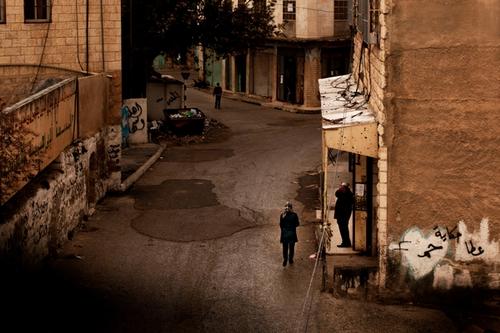A Médecins Sans Frontières (MSF) psychologist helps a young Palestinian boy cope with life on the West Bank, after a night raid by Israeli soldiers.
Ali has always been a grown-up little boy – older than his six years. Often described as “stubborn” by his family, he likes to have things his own way… or else! He is the youngest of five siblings, the others are all at least 18 years old, and are finishing school or at university.
Daily violent clashes
However, this is not the only reason Ali is older than his years. Ali lives in a large refugee camp in the West Bank, Palestine, opposite the watchtower of the Israeli Defence Forces. The camp is home to just under 10,000 registered refugees, and is considered one of the major 'hotspots' for West Bank unrest. Ali eats, sleeps and plays just 50 metres away from the setting of almost daily violent clashes between young Palestinians and Israeli soldiers. These clashes have something of a game-like pattern, usually starting when a stone is thrown at the uniformed soldiers who line up facing the refugee camp, adorned with their sophisticated weaponry. It seems that when you live in the midst of regular chaos, you need to learn to look after yourself very quickly.
When tear gas rushes through the windows of his top floor home, as it does during violent clashes, Ali is the one to shut them all. He informs his family of what is going on in the streets below, as a regular spectator of the terror and excitement played out before him. Standing nose-to-nose with guns as big as he is, Ali insists on monitoring every moment of the searches and questionings his brothers are subjected to by young Israeli soldiers as they walk the streets.
Regular nightmares
It is no wonder that Ali feels the need to take control - to look after himself. However, this need can easily transfer to “normal” life, for example, insisting on eating a chocolate bar before dinner, or demanding to watch the cartoon on TV that he wants to. MSF met Ali a few weeks after a violent incursion on his home in the middle of the night. Israeli soldiers wanted to use Ali´s family’s apartment to monitor the clashes on the street below. It is, apparently, a convenient location for a second watchtower. Ali’s mother and sister described to the psychologist that the soldiers forced their way into the house, locked the family in one room, and then occupied the family living room for hours. After that night, Ali started to have regular nightmares of soldiers with black faces (Israeli soldiers wear black face masks during house incursions), was often incontinent and would jump at even the slightest touch from someone else. His eczema all over his body, bothersome since he was two months old, got worse, and his stubbornness was described as “out of control”.
Intrusive thoughts and images
When the MSF psychologist first met Ali they got to know each other by playing games and he asked her to bring a “black football” on her next visit. The psychologist thinks that the black football relates to the traumatic incident of the soldiers in black masks who went into their home. His symptoms were intrusive thoughts and images of that incident. Maybe he was trying to get mastery over those memories by kicking/throwing the football.
Since then he has used drawings to express his fears about what happened in the past, what is happening in the present and what could happen in the future. He certainly seems hungry for games involving imagination and magic, and over time this seems to be helping him feel somewhat safer. Ali is also being treated by the MSF medical doctor to relieve the pain from his skin condition.
It is clear that being a child is not an easy thing in this West Bank refugee camp. Nevertheless, hope remains that Ali can enjoy some of the simplicity of childhood in the midst of all the complexity and chaos.



